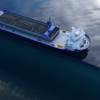Warning that improving safety trends were no cause for complacency, shoreside maritime leaders were told that the industry safety records were "totally unacceptable" by John Rose, General Manager Shipping Shell Trading (US). He expressed his opinion during a keynote address at the Professional Development Seminar for Port Captains, Marine Superintendents, Operations Managers, Safety & Training Specialists and Port Engineers sponsored by the Seamen's Church Institute (SCI) on October 22-23 at its Center in Paducah, Ky. "The number of fatalities in this industry is simply unforgivable," he said to an audience of 44 shoreside professionals from 22 different companies. "This is an industry with a safety record which indicates it is close to crisis. Many fatalities caused by bridge allisions and man overboard incidents on the barges themselves have yet to be properly addressed. Some key aspects of the safety culture on the waterways are 10-15 years where I expect them to be."
Rose is responsible for the setting of standards and business assurance of all Shell's shipping activities in the United States. While Shell owns six barges, it contracts for more than 3,000 voyages in the inland waterways. "John Rose is absolutely on the mark. No fatality is acceptable," said Eric Larrson, Director of SCI's Center for Maritime Education. "We need to get every company to raise their bar * every workplace should strive earnestly to be injury-free with all employees focused on safety." According to Rose, a documented safety management system, which is properly applied, is absolutely "crucial" for a contract from Shell. "We need to see documentation that proves that management is behind the American Waterways Operators Responsible Carrier Program."
Rose is "very concerned" that "about 75% of the inland and coastal maritime industry that has not signed on to the Responsible Carrier Program (RCP)." He warned that operators without such discipline are exposing themselves to the potential for more accidents. Among companies that are part of RCP, Rose finds it "strange" that some audit reports have no "adverse findings. Any company that is totally perfect should have zero incidents," he said. "We expect problems. We want to see how the company is addressing them." The Seamen's Church Institute developed the seminar in response to a shortage of for formalized training for shoreside personnel. "Great efforts are made within companies for the training of entry-level individuals and officers," said Eric K. Larsson, director of SCI's Center for Maritime Education. "We are encouraging the industry to look at how office and vessel personnel interact in order to create a safer environment."
Experts in maritime law, human resources, and claims participated in the two-day seminar. "SCI has the great advantage of a long history with the deep-sea industry that grapples with similar issues. Oil spills ten years ago created a safety culture in the tanker industry that can help inland companies," said Larsson.
The Seamen's Church Institute of New York & New Jersey, founded in 1834, is an ecumenical agency affiliated with the Episcopal Church. Its mission is to advance the personal, professional and spiritual well being of merchant mariners. SCI's 102-year-old Center for Maritime Education operates simulator training facilities in New York City; Paducah, KY; and Houston, TX.
Featured videos

Inmarsat Enhances Service to Drive Digitalization

Tracking Foreign Vessels Working in the U.S. Jones Act Market

Inside the Electrified Truckable Tug
Subscribe for
Maritime Reporter E-News
Maritime Reporter E-News is the maritime industry's largest circulation and most authoritative ENews Service, delivered to your Email five times per week








